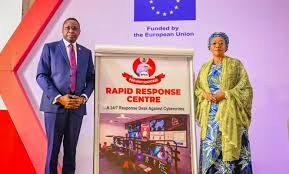The Economic and Financial Crimes Commission (EFCC) on Tuesday launched a 24- hour Cybercrime Rapid Response Centre in furtherance of its sustained efforts to frontally tackle the growing problems of economic and financial crimes in the country.
The unveiling of the Centre, which was part of the highlights of the National Cybercrime Summit organized by the EFCC with support of the Rule of Law and Anti- Corruption (RoLAC) Programme, European Union and International IDEA, by the First Lady, Sen. Oluremi Tinubu, at the Presidential Villa in Abuja, is aimed at bringing up digital and accelerated information transmission on internet fraud from the public and real time response from the Commission.
The Centre is provided with both local and international telephone numbers through which the EFCC can be reached on a 24-hour basis on matters relating to cybercrime in Nigeria and globally.
The Summit with the theme ‘Alternatives to Cybercrime: Optimizing Cyber Skills for National Development’ featured key programmes, including panel discussions on alternative frameworks to insulate youths from cybercrimes, presentation of award to winners of EFCC 2024 Essay Competition organized for students in secondary and tertiary schools in the country, and a documentary on the activities of the EFCC in the last one year.
The documentary, which covered activities of the anti-graft commission from October 2023 to September, 2024, showed that the EFCC secured 3455 convictions and made monetary recoveries of N248,750,049,365.52; $105,423,190.39; £ 53,133.64; €172,547.10; CAD $ 3,400.00; ¥74,859:00; AUS $ 740:00; 170:00 UAE; 73,000:00 Korean Won; CFA 7,821,375:00; R 50:00.
In her keynote address during the unveiling of the Centre, Mrs Tinubu noted that the theme of the summit aligned with the current challenges cybercrime posed not only in Nigeria but to individuals, entities, organizations and countries globally.
She said: “Cybercrime is not a crime against individuals and businesses. It is an assault on our collective integrity, economic stability and the future of our youth”. She praised the EFCC for devotedly seeking solution to the lingering menace.
The First Lady noted that Nigeria was confronted with the reality of the dangers and new vulnerabilities the digital age are posing to humanity.
To mitigate the threats, she advocated: “It is, therefore, crucial that we address these challenges head on and explore not only the harmful consequences of cybercrimes but also the sustainable alternatives that can redirect our youths towards productive and positive endeavours. With young people accounting for more than 60 per cent of our population, the involvement of youths in cybercrime is a threat to the nation’s quest for economic stability.”
In his welcome address, the commission’s Executive Chairman, Ola Olukoyede noted that the menace of cybercrimes, like most economic and financial crimes, was a big challenge that cannot be denied, ignored or wished away, adding that national discourse on cybercrime is necessitated by the need to collectively combat the incidents in the country.
He explained: “The overarching need for us to articulate opinions and build greater strength against the scourge of cybercrimes. This time around, we are not only interrogating the problem, we are aggregating workable solutions to it.
“The enormity of challenges posed to us as individuals and nation by cybercrimes are grievous. As individuals, youths’ involvement in these crimes is distorting and corrupting acceptable family values. The tendency towards quick riches no longer positions our young people for enterprise, resourceful intellectual aspirations and technological innovations, Olukoyede added.
In terms of financial loss, Olukoyede stated that 2,328 cases of cybercrime occur daily globally with a global loss projected to hit $10.5 trillion by 2025.
He said: “Projections by multiple sources show that the global loss to cybercrimes may reach a staggering $10.5 trillion by 2025, with approximately 2,328 (Two Thousand, Three Hundred and Twenty-eight) cases occurring daily. The implication of all these is that, if left unchecked, cybercrimes portend grave dangers to the entire world. These are the realities stoking the Commission’s fight against these crimes.”
Speaking at the forum, Minister of State for Youth Development, Mr. Ayodele Olawande, who commended the EFCC in its fight against cybercrime, said: “The Commission has done so well in planning and engaging the youths in every state that will give them the platform to do so. As youths, as a body, we are promising the EFCC that we will do everything in our power, everything we can do to make sure that Nigerian youths are with the EFCC and that we are ready to work with it. We will make sure that we will go to every nook and cranny of the 774 local government areas to spread the anti-cybercrime message”, he said.
In his remarks, the Chairman of Nigerian Governors’ Forum and Kwara State Governor, Abdulrahman Abdulrazaq commended the commission for organizing the summit and pledged his support to the Commission in its efforts to redeem the youth from the path of cyber criminalities.
The governor assured: “You have our support in this regards. We commend you on their efforts in putting this gathering together. I am sure that after this summit, we will all leave here better informed on our perception of cybercrime.”






